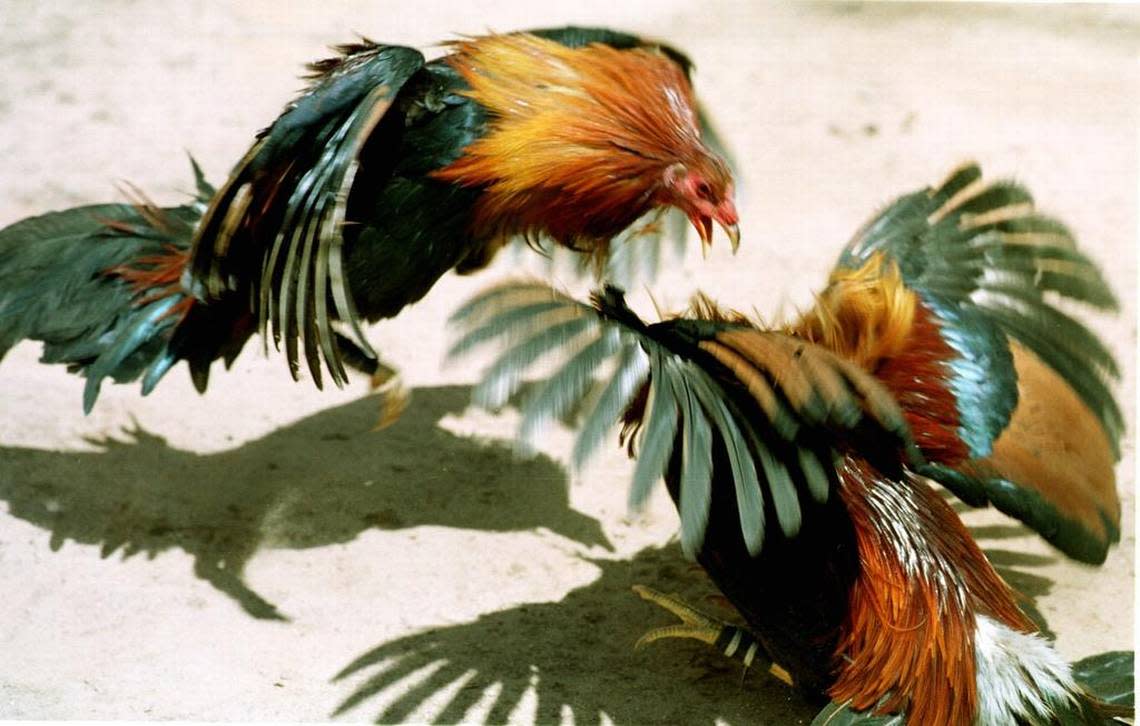One more reason to secure the Mexico border: Smuggling drives the cockfighting trade | Opinion
There is a border problem, and it’s unknown to most Americans. It’s a criminal form of trafficking. It involves scores of individual victims crossing the Rio Grande. It is a public safety threat and a massive expense to American taxpayers.
In this case, I refer to the cockfighting trade.
Cockfighting is outlawed in every state, and it is a felony in most. But south of the border, it is legal, and U.S. cockfighters smuggle hundreds of thousands of fighting birds to cartel-controlled cockfighting arenas in Mexico for regular bloodletting, high-stakes gambling and money laundering. The flow of birds also moves in the opposite direction, with the cartels shipping them along north-facing routes to their network of criminal operators in our homeland.
Court dockets in Texas counties show it’s an epidemic.
Recently, Bexar County law enforcement arrested 47 people and seized 200 birds, along with illegal weapons. A raid in Goliad County resulted in 60 arrests and several illegal weapons seized.
Earlier this year, more than 160 roosters were seized in a Potter County bust where according to the sheriff, “many” participants were “unlawfully in the United States.” At a cockfight busted by the San Jacinto sheriff, suspects were “expected to face multiple felony charges, ranging from animal cruelty, cockfighting, illegal gambling, unlawful weapon possession, organized crime, and federal firearm possession” by people in this country illegally.

We saw more of the same in Cherokee, Texas, where two dozen suspected cockfighters were arrested on similar charges. And in Lynn County, the sheriff brought felony charges “because of organized criminal activity.”
There has been a series of interdictions at the border, including a federal enforcement action in which officers “made an unusual discovery, roosters deeply hidden within passenger vehicles.”
This is no benign trade. Cockfighting is barbaric and cruel. Fighting birds are fitted with razor-sharp blades on their legs to hack and cut one another for the sick enjoyment of spectators who get a thrill from the bloodletting. But apart from this sheer barbarism, cockfights are also a gathering place where organized crime festers and spills over into communities.
In Hidalgo County, in early June, a young man shot his uncle in a dispute over birds thought to be raised for cockfighting. There was also a shooting at a Dallas cockfight last year.
The cockfighting-related violence in Mexico is chilling in its scale. In 2022, in the state of Michoacán, cartel members entered a cockfighting arena, sealed off exit routes — and killed 20 people. Three of the victims were Americans, including a mother of four from Illinois. A similar incident occurred at a cockfighting derby in Guerrero in January, where 14 people were wounded and six murdered, including a 16-year-old boy from Washington state.
Cockfighting has also been linked to outbreaks of H5N1 bird flu in Asia, and there have been 15 outbreaks of another kind of bird flu, virulent Newcastle Disease, in the U.S. in recent decades. Ten of those 15 outbreaks were linked to fighting birds smuggled across the border from Mexico. The United States indemnifies the farmers and has paid out billions of your tax dollars to reimburse them for birds lost to disease.
Texas is at a crossroads of the North American cockfighting trade. Three neighboring states — Louisiana, New Mexico and Oklahoma — were the last ones to criminalize cockfighting. Organized criminal networks of cockfighters still operate, coordinating with associates in Texas and Mexico and contributing to the crime wave.
This is one more border crisis we cannot ignore.
A bill in Congress would strengthen federal enforcement of our laws against animal fighting. The FIGHT Act would ban online gambling on animal fights, allow courts to seize fighting pits and other property used by convicted animal fighters in the commission of their crimes and stop the shipment of fighting roosters through the mail. It would also allow law-abiding citizens to protect their homes and families by bringing civil suits against cockfighters and dogfighters when governmental authorities are too slow to act.
With a law such as the FIGHT Act to protect the public from deadly cross-border crimes, we could finally put an end to the scourge of illegal animal fighting in Texas and across our nation.
Wayne Pacelle is president of Animal Wellness Action and the Center for a Humane Economy at animalwellnessaction.org . He is the author of two New York Times bestselling books about the human relationship with animals.

